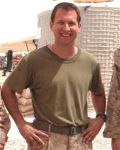HELMAND PROVINCE, Afghanistan — A Marine Corps pilot switched his workplace from the air to the ground to coordinate sky-launched assaults against the enemy here.
Capt. Daniel Fiust had flown missions with other AV-8B Harrier jet pilots assigned to Marine Attack Squadron 513. Now he’s helping to provide close-air support from the sky to Marines fighting on the ground. “We look at what type of support the Marines need, and update our tactics based on what we’re seeing of the enemy from the air,” said Fiust, who hails from San Carlos, Calif.
In his role as air officer and a forward air controller for 3rd Battalion, 4th Marine Regiment, Fiust serves as the coordinator between the battalion and the fixed- and rotary-wing assets of 2nd Marine Aircraft Wing (Forward). A battalion air officer serves as a liaison for aviation squadrons supporting ground Marines, directing and dispersing air assets across the battalion’s area of operations.
Fiust said he’s responsible for coordinating flight times and routes for dozens of combat aircraft dedicated to protecting Marines on the ground.
“We integrate all functions of aviation with ground combat missions,” he said. “Basically, anything aerial, we have a role in.”
A veteran of Operation Iraqi Freedom, Fiust had spent more than three years with flying squadrons, when he reported to the air officer’s course, part of Marine Aviation Weapons and Tactics Squadron 1’s Weapons and Tactics Instructor course.
“I really wanted to work with infantry units,” Fiust explained. “As a [close-air support] pilot, I wanted to see what things were like on the ground and do my part to contribute.”
The air officer is the senior forward air controller in a battalion, supervising the unit’s forward air controllers and enlisted joint terminal attack controllers, who patrol with their squads and protect them by calling in airstrikes.
Fiust said he believes the relationship between air officers on the ground and the squadrons is an example of military teamwork that saves lives.
Andhis new responsibilities on the ground provide a different perspective about fighting the war, Fiust said.
“As a pilot, I sometimes felt detached from the situation,” he said. “As an air officer, you’re more emotionally invested.”
Source:
U.S. Department of Defense
Office of the Assistant Secretary of Defense (Public Affairs)

 von
von 